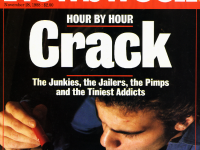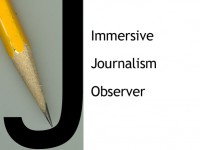What’s Making That Awful Racket? Surprisingly, It May be Fish
This story made it to the top ten most emailed list.
What’s Making That Awful Racket? Surprisingly, It May Be Fish
New York Times | Science Times | April 8, 2008
Read the Article | Listen to the Sounds |
This is the web video that was published with the piece:
Colbert did a great spoof about the piece:
Palettes – virtual and prehistoric
Having just visited the Grottes d’Arcy-sur-Cure in France, I was struck by how these prehistoric painters used the ridges and pockets of the cave walls to enhance and describe their art. Small holes become eyes, and candlelit shadows form horns. Incredible, considering this particular cave contains what is currently the second oldest known example of humans creating art (which, of course, says some interesting things about the French in general.) I often find myself explaining that virtual reality is simply another palette and using the medium to tell non-fiction simply takes the world as I find it – full of 3D and virtual technologies that are excellent for creating first person experience of the news.
The Fascinating Virtualpolitik
We highly recommend Liz Losh’s excellent Virtualpolitik: An Electronic History of Government Media-making in a Time of War, Scandal, Disaster, Miscommunication, and Mistakes (MIT Press 2009). From the MIT Press description: Today government agencies not only have official Web sites but also sponsor moderated chats, blogs, digital video clips, online tutorials, videogames, and virtual tours of national landmarks. Sophisticated online marketing campaigns target citizens with messages from the government—even as officials make news with digital gaffes involving embarrassing e-mails, instant messages, and videos. In Virtualpolitik, Elizabeth Losh closely examines the government’s digital rhetoric in such cases and its dual role as media-maker and regulator. Looking beyond the usual focus on interfaces, operations, and procedures, Losh analyzes the ideologies revealed in government’s digital discourse, its anxieties about new online practices, and what happens when officially sanctioned material is parodied, remixed, or recontextualized by users.
You can also check out Liz’s ever fascinating blog of the same name which she describes as: A BLOG ABOUT DIGITAL RHETORIC THAT ASKS THE BURNING QUESTIONS ABOUT ELECTRONIC BUREAUCRACY AND INSTITUTIONAL SUBVERSION ON THE INTERNET.
The Future of Journalism
Peggy Weil attended the Future of Journalism: Unpacking the Rhetoric conference at The Stanford Law School Center for Internet and Society held on April 30th. The site includes video as well as summaries of all of the panels.



